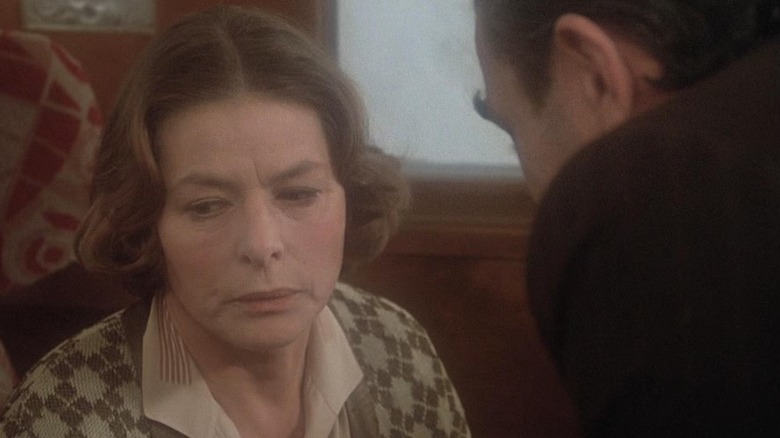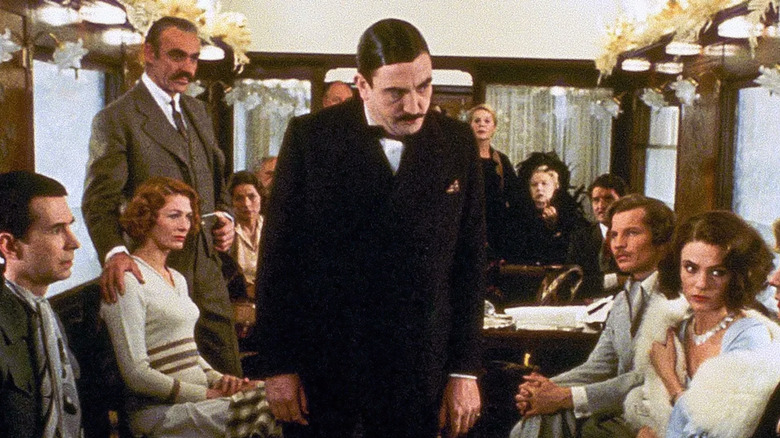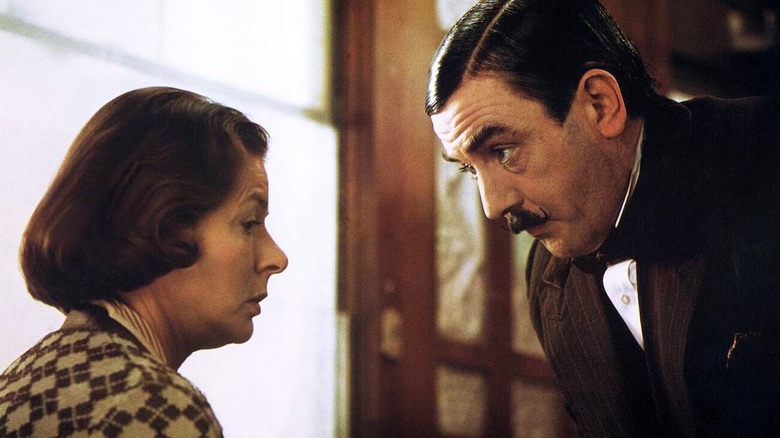Ingrid Bergman Won Her Final Oscar For A Classic Agatha Christie Adaptation
Among the most legendary actresses of all time, Ingrid Bergman looms large. Bergman's career extended across decades, and she was able to work with some of the greatest filmmakers of all time, from Alfred Hitchcock to Michael Curtiz to Leo McCarey. And moreover, many of the films in her filmography are widely, and correctly, considered among the best English-language films ever made, from "The Bells of St. Mary's" and "Gaslight" to one of the most iconic American and World War II films ever, "Casablanca." Bergman, unsurprisingly, was well rewarded for her immense talent and acting craft, netting three Oscars (as well as being nominated four other times). That she wasn't even nominated for "Casablanca," a film that has a near-perfect score on Rotten Tomatoes and walked away with the Best Picture Oscar, says something about how good she was and how not every one of her performances could get the golden statuette. (If you're curious, you can read our ranking of her 15 best films here.)
The last time she won an Oscar, Bergman had aged into her golden years and was playing roles less accustomed to leading ladies as much as supporting players. The year was 1974, in which Francis Ford Coppola reigned with both "The Godfather, Part II" and "The Conversation." But Bergman won her last Oscar, and her only Best Supporting Actress award, for a different film, a throwback of sorts: a mystery movie with a vast ensemble of acting legends, adapted from a story by one of the most famous authors of all time and featuring a most familiar detective. The film was "Murder On the Orient Express," starring Albert Finney as Hercule Poirot, the sleuth created by Agatha Christie.
Though Bergman won her last Oscar for Murder On the Orient Express, she was one of many acting titans in the film
If you're familiar with the 2017 remake of the same name, directed by and starring Kenneth Branagh, you may have some vague familiarity with the plot of "Murder On the Orient Express." It's the winter of 1935, and Poirot is on the eponymous train, traveling from Istanbul to London, among a vast coterie of potentially suspicious types who all become murder suspects when American businessman Samuel Ratchett (Richard Widmark) is found dead after being stabbed a dozen times. All while on the train to London, it's up to Poirot to figure out whodunit and why, both to ensure that a murderer is brought to justice and to avoid any other attacks. But solving the murder is a bigger challenge than expected, even for the legendary Poirot, as it becomes clearer and clearer that many of the people on the train had connections to the dead man, and may well have wanted to see him deceased.
Among the other passengers, there's a British Army colonel (Sean Connery), an English governess (Vanessa Redgrave), an American socialite (Lauren Bacall), a Hungarian count and his wife (Michael York and Jacqueline Bisset), and more. If those names aren't impressive enough, the cast is also joined by Martin Balsam, John Gielgud, Anthony Perkins, and Wendy Hiller, among a few others. With Sidney Lumet of "12 Angry Men" and future Best Picture winner "Network" behind the camera as director, it's no surprise that "Murder On the Orient Express" was a big success with critics and audiences of the time, becoming the eleventh highest-grossing film of the year in the United States. And the film received six Oscar nominations that year, including one for Finney as Best Actor. But it only netted one victory: for Bergman, who played Swedish missionary Greta Ohlsson.
That Bergman stood out among her peers in "Murder On the Orient Express" is as much a commentary on her status as a film icon as it is in her tender and quiet performance. (Whatever else can be said, it's not as if she's the only icon in the film, and not even the only woman to have shared romantic scenes in the 1940s with Humphrey Bogart; Lauren Bacall had that honor too.) Ohlsson, like just about everyone else Poirot encounters, is covering up the truth about herself and about her connection to the dead man, and the child who was murdered under her watch. The story is notable for its final twist involving exactly who committed the murder (and the fact that it's more than one person whodunit), but Bergman stands out because of her emotional but not histrionic performance.
Bergman's final Oscar win is as much a commentary on her iconic status as on her work in the film
How much of the win that Ingrid Bergman had in 1974 is because her performance was truly the best, as opposed to Oscar voters wanting to celebrate the legend one more time? Though Bergman would be nominated a few years later in the Best Actress category for her work in Ingmar Bergman's "Autumn Sonata," she was already hitting her sixties (and would only appear in a few more films anyway). Certainly, this isn't the only time that an acting legend wins an Oscar as much for their status in the industry as for the specific film. (A good example of that would be Al Pacino's first Best Actor win for "Scent of a Woman." It's a memorable role but not even close to his best, and certainly not his best up to that point in his career.) Bergman's fellow nominees in 1974 included Diane Ladd for her role in Martin Scorsese's "Alice Doesn't Live Here Anymore," and Madeline Kahn as the raucous German temptress Lili Von Shtupp in "Blazing Saddles." This isn't to say that Bergman's not very good in "Murder On the Orient Express," but had she not won for the part, it could've gone to another talented (and younger) actress.
But Ingrid Bergman did win that third Oscar, and managed to do so as one of only two actors nominated in the huge cast of Sidney Lumet's adaptation of "Murder On the Orient Express." Although it may not be her most famous film, it's managed to endure thanks in part to the aforementioned remake from Kenneth Branagh, as well as the fact that Agatha Christie's novels featuring Hercule Poirot continue to be treasured by new generations of mystery lovers. If nothing else, Bergman winning the third Oscar is a fine capper to a remarkable career that allowed her to celebrated by critics, audiences, and Hollywood itself.


